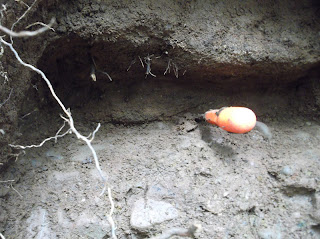Some of the red you can see is caused by the dust from the deposits above but there are a lot more of the red veins than first thought.
 The clay both red and blue is extremely tough almost rock like, and appears greasy.
The clay both red and blue is extremely tough almost rock like, and appears greasy.
 The clay both red and blue is extremely tough almost rock like, and appears greasy.
The clay both red and blue is extremely tough almost rock like, and appears greasy.The image below i think shows two separate red brown layers, something we did not notice with the cores taken with the auger.

 I have dug a 1.5 metre test hole about 15 metres down stream, with no sign of the blue deposit, so it seems this is a high point in the blue deposit at least as far as the beck side is concerned.
I have dug a 1.5 metre test hole about 15 metres down stream, with no sign of the blue deposit, so it seems this is a high point in the blue deposit at least as far as the beck side is concerned.



































 Al of the items have one thing in common they have only ever been washed and dried, yet shine like they have been polished.
Al of the items have one thing in common they have only ever been washed and dried, yet shine like they have been polished.


















